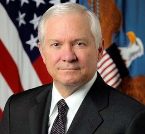US Defence Secretary in Baghdad; blasts kill 12
 Baghdad - Car bombs killed 12 people in Baghdad on Monday as US Defence Secretary Robert Gates arrived in the Iraqi capital on the eve of a change in command of the US-led forces.
Baghdad - Car bombs killed 12 people in Baghdad on Monday as US Defence Secretary Robert Gates arrived in the Iraqi capital on the eve of a change in command of the US-led forces.
Some 32 people were injured in the twin blasts, which occured near a family law court in the downtown area of al-Karada.
They happened as US General David Petraeus was spending his last day in Iraq as commander of the Multi-Lateral Iraq force.
In a ceremony due to be attended by Gates later Monday, Petraeus was to hand over command to his former deputy, Lieutenant-General Ray Odierno.
Odierno served as Petraeus' right hand for 15 months until February. He will be promoted to full general on Tuesday.
Petraeus led the Army's 101st Airborne Division during the 2003 invasion of Iraq. He won kudos for his management of the occupation forces in the northern part of the country, including the restive city of Mosul.
He also led efforts to train a new Iraqi army and was a major contributor to the writing the army's counter-insurgency manual.
Petraeus' term, which started in early 2007, was marked by a decline in violence in Iraq.
Backed by 30,000 extra US soldiers, Petraeus and Odierno implemented a new counter-insurgency strategy that, combined with other factors, improved drastically the security situation in what was once dubbed "the most dangerous country in the world."
While analysts believe deadly attacks in Iraq are not yet history, they admit that the country is way beyond the civil-war wreck it had been in the post-invasion era.
According to reports, violence in the Iraqi capital had fallen to its lowest level since 2004.
The spokesman for Baghdad Operations Command, General Qassim Atta, said in August that military operations have dropped by 89 per cent for the month, compared to the August 2007 and 2006.
This drop in violence prompted US President George W Bush to plan to withdraw an additional 8,000 troops from Iraq by February.
The pullout will reduce the US presence to about 138,000 soldiers. Odierno's main task, according to analyst, will be how to maintain the gains of his predecessor as the number of US forces declines and Iraqis are handed over more of their country.
In a farewell letter posted on the Web site of the Multi-National Force in Iraq, Petraeus described achievement of US troops in Iraq as "the stuff of history."
He wrote that when he took command in February 2007 the situation was difficult but not hopeless.
"You have proven that assessment to be correct. Your great work, sacrifice, courage, and skill have helped to reverse a downward spiral toward civil war and to wrest the initiative from the enemies of the new Iraq," the letter read.
"You have not just secured the Iraqi people, you have served them, as well," Petraeus wrote, describing his forces as "builders and diplomats as well as guardians and warriors."
Petraeus, however, acknowledged that with all these achievements challenges remain. "(US-led forces') tasks in Iraq are far from complete and hard work and tough fights lie ahead," he noted.
Petraeus is being promoted to head of US Central Command, which operates in the Middle East expanding his area of responsibility to 25 countries, including Iran, Afghanistan and Pakistan.
His promotion follows the March resignation of Admiral William Fallon, following news reports that he was at odds with the White House over how to handle Iran. (dpa)